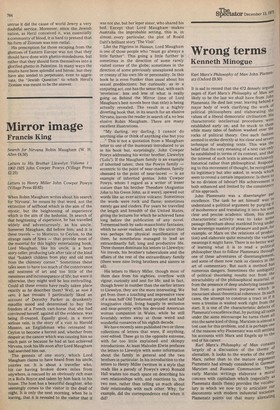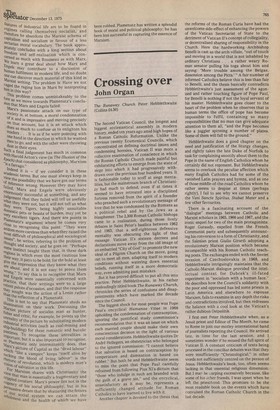Wrong terms
Kenneth Minogue Karl Marx's Philosophy of Man John Plamenatz (Oxford £9.50) It is sad to record that the 472 densely argued pages of Karl Marx's Philosophy of Man are likely to be the last we shall have from John Plamenatz. He died last year, leaving behind a major body of work clarifying the work of political philosophers and elaborating the values of a liberal democratic civilisation. 1-1is characteristic intellectual procedures were established early on, and he stuck to theal while many tides of fashion washed over the rocks of political theory. One such fashion seemed to strike directly at his close and severe technique of analysing texts. This was the belief that the very meaning of a text can onlY be established in terms of its context, and that the interest of such texts is almost exclusively historical rather than philosophical. Responding to this movement of thought, he recognised its legitimacy but also asked, in words which seem to reveal a certain impatience: Is there to be no division of labour? His achievement 15 both enhanced and limited by the consistency of his approach. John Plamenatz was a disentangle" Par excellence. The task he set himself was to understand a political argument by purging it of incoherence and translating it into his own clear and precise academic idiom. His most characteristic activity was to take some passage (Bentham about mankind living under the sovereign mastery of pleasure and pain, for example, or Marx on the relations of production) and elaborate quite minutely the various meanings it might have. There is no better way of learning what it is to read a political philosopher than to follow Plamenatz through one of these adventures of disentanglement, and some of them now rank as classics in the art of commentary. But such a method has numerous dangers. Sometimes the ambiguity of political theorising results not from the intractability of the philosophical material, or from the presence of deep underlying tension' but from a persuasive purpose which IS insouciant about theoretical coherence. In such cases, the attempt to construe a tract as if it were a treatise is wasted work right from the start. It is one of the characteristic defects of Plamenatz's excellence that, by putting all texts under the same microscope he turns them all into the same kind of thing. Marxism is almost a test case for this problem, and it is perhaps one of the reasons why Plamenatz was still settling his accounts with Marx and Engels up to the end of his career.
Karl Marx's Philosophy of Man consists largely of a discussion of the theme of alienation. It looks to the works of the earlY Marx, rather than to the mature argument Plamenatz had already considered in German Marxism and Russian Communism. These early Marxist writings elaborate a moral concern with capitalism which (especially as Plamenatz distils them) provides the vocabu" lary in which we now try to articulate our discontents with modern industrial societies. Plamenatz points out that many alienating
features of industrial life are to be found in regimes calling themselves socialist, and
therefore he abandons the Marxist schema of
capitalism and socialism in favour of a less sectarian moral vocabulary. The book appropriately concludes with a long section about freedom and self-realisation which is concerned as much with Rousseau as with Marx.
We learn a great deal about how Marx and
Engels may contribute to a discussion of human fulfilment in modern life, and no doubt one can discover much material of this kind in Marxist writing. The problem is: Have we not caged the raging lion in Marx by interpreting him in this way? _ This problem comes unmistakeably to the fore as we move towards Plamenatz's conclusion that Marx and Engels failed: Marx's passionate attack on our type of society is, at bottom, a moral condemnation of it and is impressive and moving precisely Oil that account, but it is an attack which does as much to confuse as to enlighten his readers . . It is as if he were pointing with °he hand in the direction in which he wanted Men to go, and with the other were throwing dust in their eyes.
Such a final judgement has much in common With Harold Acton's view (in The Illusion of the Epoch) that considered as philosophy, Marxism .
a farrago."
Indeed it is if we consider it in these academic terms. But one must always keep in view the possibility that we have got our terms .of reference wrong. However they may have railed, Marx and Engels were obviously enormously successful at something, and any judgement that they failed will tell us usefully rat th -eY were not, but it will not tell us what d 'y Were. Tigers, being highly unsuitable _otnestic pets or beasts of burden, may yet be rY excellent tigers. And there are points in crilamenatz's argument where he comes very seldom se to recognising this point: "They were ,.., more careless than when they raised the ;ut3st difficult of philosophical and sociological t's,Sues", he writes, referring to the problem of snought and society, and he goes on: "Perhaps c'rne instinct taught them that, in these dark r their in which even the most cautious lose Way, it pays to be bold; for the bold at least give the impression that they know what they are about, and it is not easy to prove them _,orig-" To say this is to recognise that Marx a . nu Engels were essentially concerned with Practice, that their writings were to a large they pices d'occasion, and that the response h theY sought was the action of a Lenin rather than the reflection of a Plamenatz. 11T 11T
his is not to say that Plamenatz sheds no rvinthination on their work. Discussing the
4,rXist picture of socialist man as hunter, “sner and critic, for example, he points up the UnnrealitY of the picture by substituting modern d
ustrial activities (such as coal-mining and anin-building) for these romantic and bucolic
p astintes. To recognise these unrealities is _rnnortant; but it is also important to recognise, Plamenatz only intermittently does, that `,nt"
,arx's picture of Capital as the "dead labour" sa
"like a vampire" keeps "itself alive by rbeetking the blood of living labour" is the of revolution, which is modern man's ',Inn of salvation in this life. rc'r Marxism shares with Christianity the c_teW that man is essentially a fragmentary and corIPPled creature. Marx's power lies not in the 1-2encY of his social philosophy, but in his o's-f.' suasive dream that by shattering the fetters whon:"or social system we can attain the
less and the health of which we have been robbed. Plamenatz has written a splendid book of moral and political philosophy; he has been less successful in capturing the essence of Marxism.


































 Previous page
Previous page